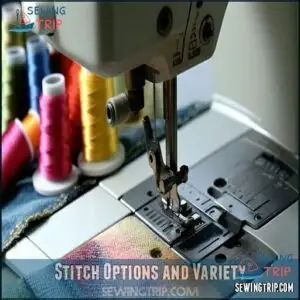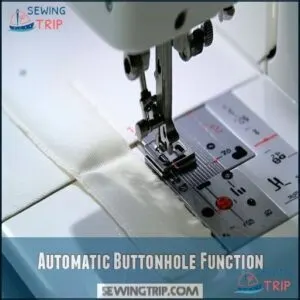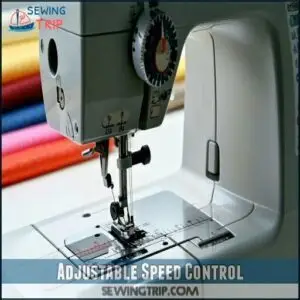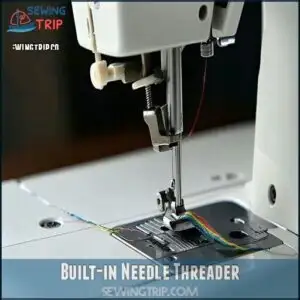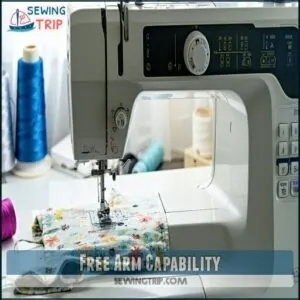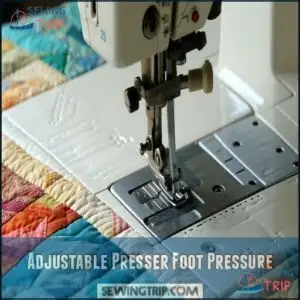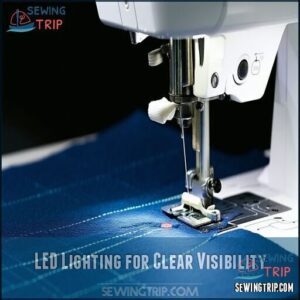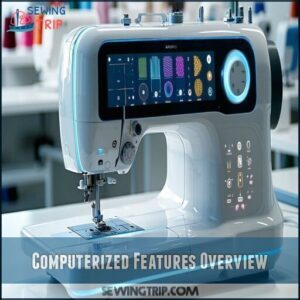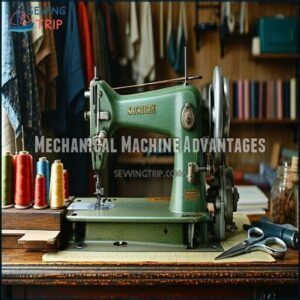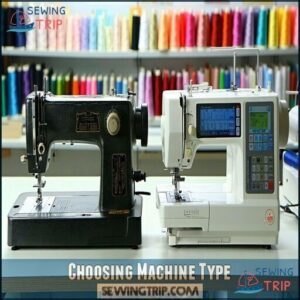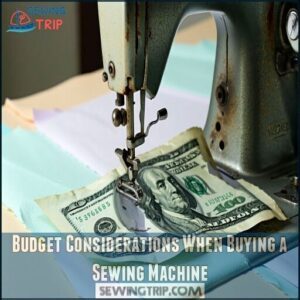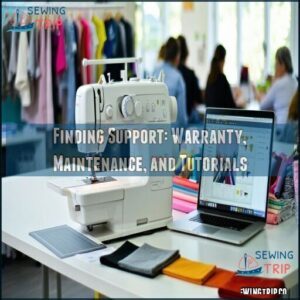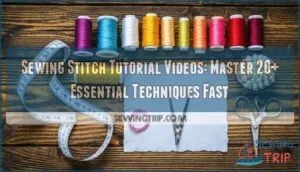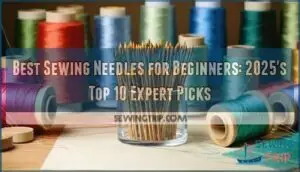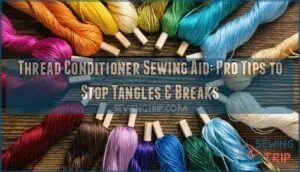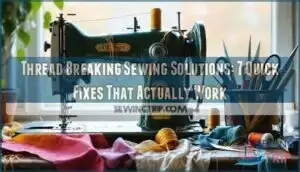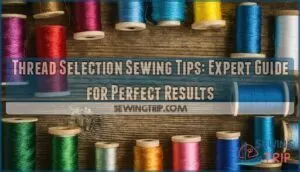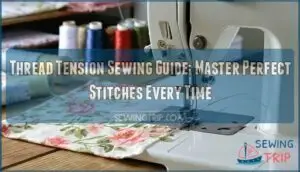This site is supported by our readers. We may earn a commission, at no cost to you, if you purchase through links.
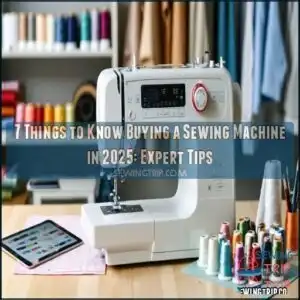 When buying a sewing machine, you’ll want to focus on seven key factors.
When buying a sewing machine, you’ll want to focus on seven key factors.
First, match your budget to your needs—you don’t need a Ferrari when a reliable sedan will do. Second, consider stitch options that align with your projects. Third, decide between computerized (tech-savvy) or mechanical (straightforward) models.
Fourth, test the machine’s noise level—your family will thank you. Fifth, check the weight and size if you’ll move it often. Sixth, look for user-friendly features like automatic threading.
Table Of Contents
Key Takeaways
- Match your budget to your needs—you don’t need an expensive machine if a basic model will handle your projects, with most quality machines in the $200-600 range offering good value.
- Consider whether you want a computerized machine (with digital controls and advanced features) or a mechanical one (simpler, more durable, and often more affordable).
- Look for essential features that will make your sewing easier, including stitch variety, automatic needle threading, adjustable speed control, and good LED lighting.
- Don’t overlook support options like warranty coverage, repair services, and dealer training—these can be as valuable as the machine itself and extend its useful life.
Essential Features for Your Ideal Sewing Machine
When choosing a sewing machine, you’ll want features that make your projects smoother and more enjoyable.
From stitch variety to LED lighting, picking the right options guarantees your machine handles everything you throw at it, whether it’s hemming jeans or crafting a quilt.
Stitch Options and Variety
In the context of sewing machines, selecting the right stitch options can make or break your projects. Don’t just examine the number of built-in stitches—focus on their variety and utility.
Basic straight and zigzag stitches handle everyday needs, but adding decorative stitches delivers flair, while stretch stitches tackle knits effortlessly. Specialty stitches are your secret weapon for precise seams and fabric manipulation. Think of your stitches as tools in a well-stocked toolbox—each serving a clear purpose.
For specialized tasks, consider exploring options for purchasing sewing products.
Here’s what’s key:
- Utility Stitches for everyday repairs and seam finishing.
- Stretch Stitches to keep stretchy fabrics resilient.
- Decorative Stitches for creative detailing.
- Adjustable Stitch Length/Width to fine-tune precision.
Automatic Buttonhole Function
An automatic buttonhole function is a game-changer in sewing machine features.
Forget the days of fumbling with manual, multi-step buttonholes—this feature makes it effortless.
It’s like having a pro tailor packed into your machine.
With automatic buttonholes, you’ll enjoy:
- Perfect Buttonhole Styles: Achieve consistent, professional results, even on tricky fabrics like denim or silk.
- Effortless Fabric Compatibility: Work seamlessly across fabric types without sacrificing quality.
- Quick Adjustments for Button Size: Simply place your button in the presser foot, and your machine does the math.
- Reliable Function: Smooth, single-step operation saves time while enhancing ease of use.
This feature elevates your sewing projects, adding polish and confidence to your work!
Adjustable Speed Control
After tackling buttonhole mastery, let’s explore adjustable speed control—one of those sewing machine features you’ll appreciate endlessly.
This feature balances motor power and stitch precision, making it a favorite for both pros and beginners.
Whether you’re handling lightweight fabrics or sewing through heavy denim, smooth speed control adjusts effortlessly to your project complexity and fabric compatibility.
| Benefit | What It Does | Why It Matters | Who It Helps |
|---|---|---|---|
| Fabric Compatibility | Adapts speed to fabric | Avoids snags and messy stitches | All sewers |
| Stitch Precision | Enhances accuracy | Supports detailed projects | Beginners, advanced sewers |
| Learning Curve | Reduces sewing difficulty | Builds confidence | Beginner sewing machine users |
| Motor Power | Eases machine strain | Promotes durability | Long-term users |
Built-in Needle Threader
If threading a needle feels like a battle against your eyesight, a built-in needle threader is your new best friend.
Found on many beginner sewing machines, this handy feature saves you from squinting and swearing by smoothly guiding the thread through the needle’s eye with a quick lever action.
Besides sparing you endless threading difficulty, it also reduces eye strain and user frustration—especially during long sewing sessions.
A great place to start is by researching needle threader products.
Keep an eye on threader durability and verify proper threader maintenance, as this small addition can make threading a snap for years to come.
It’s the unsung hero of sewing machine features!
Free Arm Capability
A sewing machine with a free arm changes the game for Tubular Projects like Sleeve Sewing or handling Pant Hems.
By detaching the flat base attachment, the free arm creates a cylindrical space, making tricky tasks much easier. This nifty machine feature is perfect for projects that otherwise feel like wrestling fabric into submission.
Here’s how it shines:
- Sleeve sewing becomes smooth without twisting fabric awkwardly.
- Pant hems glide effortlessly under the needle—no bunching, no drama.
- Small tubular garments (think kids’ clothes) become less intimidating.
- Bag straps and cylindrical items stay neat and under control.
For extra versatility, the free arm even supports Free-Motion Embroidery. Regular oiling keeps this feature in top form.
Adjustable Presser Foot Pressure
Adjustable presser foot pressure mightn’t sound flashy, but it’s a game-changer in your sewing journey.
This machine feature lets you tweak how tightly the presser foot holds the fabric, improving fabric feed, preventing fabric damage, and ensuring even stitching. Think of it as your secret weapon for stress-free sewing!
Here’s why it matters:
- Delicate fabrics like silk won’t pucker with lighter pressure.
- Thick materials like denim stay steady with firm settings.
- Stretchy knits won’t stretch out or get wavy seams.
- Quilting applications are a breeze—layers stay beautifully aligned.
Instead of swapping specialty feet constantly, adjustable presser foot pressure makes one machine handle all fabrics. Incorrect settings can lead to skipped stitches and other issues. A small tweak for smoother sewing!
LED Lighting for Clear Visibility
Good lighting isn’t a luxury—it’s essential.
LED lighting on modern sewing machines guarantees maximum brightness, reducing eye strain and helping you spot every thread and stitch, even on dark fabrics.
The strategic light positioning eliminates pesky shadows, so nothing gets in your way.
You’ll appreciate how adjustable settings let you customize brightness for late-night projects.
Plus, these LED types are energy-efficient and stay cool, unlike older bulb options.
With an incredible bulb lifespan, the lights often outlive the sewing machine itself.
This small but mighty feature can transform your sewing experience, keeping every detail clearly within view, making it a complete concept that improves your work.
Computerized Vs. Mechanical: Choosing Your Perfect Match
When choosing between computerized and mechanical sewing machines, it’s all about finding what fits your sewing style and projects best.
While one offers high-tech convenience, the other shines with simplicity and durability—so it’s worth weighing your options carefully.
Computerized Features Overview
A computerized sewing machine is your high-tech assistant, bringing precision and ease to every project.
A computerized sewing machine transforms every stitch into precision and ease, making crafting smarter and effortlessly enjoyable.
Think of it like sewing with a genius by your side—it’s packed with computerized features that make stitching smarter and hassle-free.
One standout is the touch screen interface, where you can tap settings instead of fiddling with dials. Another game-changer is stitch programming, which lets you craft custom stitch combinations. Plus, LCD screens display stitch options, error messages, and other handy cues.
Here’s a quick rundown:
| Feature | What It Does | Why You’ll Love It |
|---|---|---|
| Memory Functions | Saves custom stitches | Say goodbye to repetition |
| Automatic Buttonhole | Simplifies closures effortlessly | Perfect, professional buttonholes |
| Built-in Needle Threader | Threads needles automatically | Saves time, avoids frustration |
With all this, sewing’s never been so efficient—or fun!
Mechanical Machine Advantages
Mechanical sewing machines stand out with their simple operation, making them incredibly beginner-friendly.
They’re built tough, focusing on durability, often lasting 20 years or more. Unlike computerized options, they’ve got an affordability factor that’s hard to ignore, perfect for tighter budgets.
Here’s why they’re worth it:
| Feature | Benefit | Who It’s For |
|---|---|---|
| Simple Operation | Easy to master | Beginners |
| Durability Focus | Long-lasting use | Frequent Sewers |
| Repair Ease | DIY fixes possible | Self-reliant Sewists |
| Affordability | Budget-friendly option | Cost-Conscious Buyers |
| Tactile Feedback | Natural sewing instincts | Skill-Developing Users |
With no complex gadgets or circuit boards to fail, they’re dependable and predictable—ideal for those who value no-fuss sewing.
Choosing Machine Type
Choosing the right sewing machine type can make or break your projects.
Think of it like picking between a trusty bike and a fully-loaded car—each has its perks!
Here’s a quick comparison:
Ease of Use
Price
Maintenance
Durability
Precision
Mechanical sewing machines are best for beginners or heavy-duty needs, while computerized sewing machines wow with embroidery options and specialty features.
Ask yourself: Do you prefer simplicity or advanced capabilities?
Always match the machine to your sewing machine types and project demands!
Top 5 Sewing Machines for Beginners
Choosing your first sewing machine can feel overwhelming, but starting with a beginner-friendly option makes it much easier.
These top five machines combine simplicity, affordability, and practical features to help you learn without frustration.
1. Portable Handheld Sewing Machine
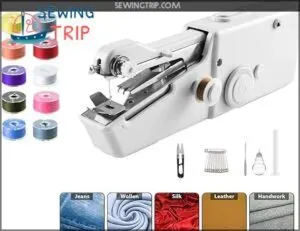
If you’re exploring beginner sewing machines, a portable handheld sewing machine might steal your attention.
These compact, lightweight devices (about 230 grams) are perfect for quick fixes, making them the multitool of sewing gadgets. Whether you’re patching up a seam during a road trip or tackling a last-minute hemming job, these machines deliver convenience in a pocket-sized package.
Here’s why they’re worth a look:
- Fabric Limitations: They handle materials up to 1.8mm thick, but don’t expect stellar stitch quality on heavier fabrics. Think silk over denim!
- Power Source: Use four AA batteries (for short spurts) or a DC 6V adapter for smoother performance.
- Intended Use: Ideal for simple repairs, these mini machines aren’t built for heavy-duty projects.
Consider it your sewing emergency kit—handy, affordable, and portable. It won’t replace a standard machine but shines when repair challenges arise, especially on the go.
2. Beginner Friendly Sewing Machine Kit
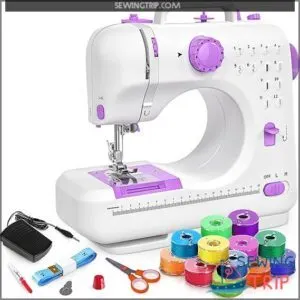
Looking for a sewing machine that’s easy to use and designed for beginners? The AUBO beginner-friendly sewing machine kit is your go-to choice.
It’s packed with essential tools to make sewing for beginners smooth and enjoyable. With 12 built-in stitches, you can tackle everything from basic repairs to fun project ideas with ease.
The dual-speed control lets you master skills at your own pace, while the automatic thread rewind and built-in cutter eliminate common frustrations.
Compact yet powerful, this machine measures just 11 inches, making it a perfect storage solution for small spaces.
The built-in LED light helps you see every detail clearly. Add AA batteries (not included), and this kit offers one of the top sewing machines for beginners!
3. Kids Portable Sewing Machine Kit
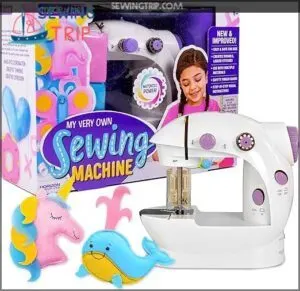
If you’ve got a budding young creator at home, a Kids Portable Sewing Machine Kit is an exciting way to spark their imagination while keeping them safe.
This beginner-friendly sewing machine for children is ideal for ages 8 and up, combining fun with practical learning.
Packed with thoughtful safety features, it guarantees worry-free stitching:
- Built-in finger guards and a safety light protect little hands during use.
- Adjustable speeds let kids start slow as they build confidence.
- Pre-threaded bobbins eliminate frustrating setup for an easier experience.
- A colorful project booklet introduces age-friendly crafts like pillows and bookmarks.
- The kit contents include everything: fabric sheets, thread spools, and even a measuring tape.
Kids will cherish the educational value this machine brings as they create unique projects. While occasional connection issues might pop up, they’re just tiny bumps on the road to building lifelong skills. Prepare to cheer on their creativity and confidence!
4. Portable Mini Sewing Machine for Beginners
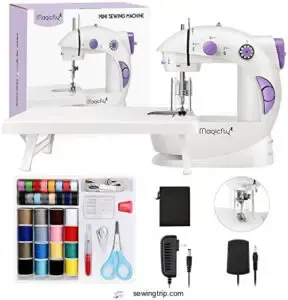
If you’re new to sewing and want a compact, beginner-friendly option, the portable mini sewing machine is a fantastic start.
It’s small enough to tuck into a drawer but packed with features to handle quick fixes and light projects. Don’t expect bells and whistles—it excels in portability but has limited capabilities perfect for straightforward tasks.
This machine is ideal for learning the ropes without stress, offering:
- Dual-speed control, so you can ease into sewing at your own pace.
- Battery or foot pedal options, making it super versatile for travel or home use.
- Kid-safe design, with clear threading guides for beginners or supervised young crafters.
Perfect for mask-making, hemming, or patchwork, it handles everyday challenges like a pro. Consider the space-saving design if you have a smaller sewing area. The double-thread design guarantees stitches stay put, while its durability keeps it going despite its modest size. It’s a fun, approachable way to sew on-the-go!
5. Singer Start 1304 Sewing Machine
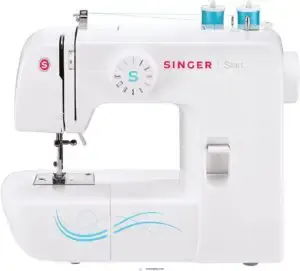
If you’re starting out in sewing, the Singer Start 1304 is a fantastic choice with its simple operation and entry-level features.
Weighing just 7 pounds, this lightweight design is easy to carry, making it perfect for crafting anywhere—or storing away neatly after finishing your project!
It offers 57 stitch applications with preset widths and lengths, so you can skip the guesswork and focus on your beginner projects.
The automatic bobbin winding and built-in reverse stitch also make basic tasks a breeze.
However, it doesn’t include a needle threader, which might slow things down slightly for those with struggling eyesight.
Here’s a quick breakdown of why the 1304 stands out:
| Feature | Description |
|---|---|
| Stitch Applications | 57 preset options |
| Weight & Portability | 7 pounds, easy to transport |
| Warranty | 25 years |
| Price Range | Budget-friendly for beginners |
At a budget-friendly sewing machine price, the Singer Start 1304 is both reliable and approachable for first-time sewists.
Budget Considerations When Buying a Sewing Machine
When buying a sewing machine, setting a budget helps you avoid overspending while still getting the features you need.
Balancing cost and quality guarantees you’re investing in a machine that lasts without breaking the bank.
Setting a Realistic Price Range
Setting a realistic sewing machine budget helps avoid Budget Creep and keeps spending focused.
Think about your needs now and for Future Projects—prioritize must-have features over frills.
Here’s a breakdown of sewing machine price ranges:
- Daily stitchers: Spend $500-$900 for durability and quality.
- Hobbyists: Aim for $200-$400 to balance fun and value.
- Quick fixes: $100-$200 works for basic mending.
Explore Payment Options if you’re aiming higher, or check secondhand machines for a steal.
Many beginners find a cheap sewing machine meets their initial needs.
Remember, a good investment in a trusted brand means fewer headaches later!
Cost Vs. Quality Trade-offs
Balancing a sewing machine budget with quality means finding a sweet spot between affordability and performance.
Machines under $200 may tempt you but often sacrifice essential features or durability. Shooting for $200-$600 delivers solid options for hobbyists and beginners, while $600-$1200+ models cater to advanced needs.
Here’s a comparison to simplify things:
| Price Range | Suitability | Key Features |
|---|---|---|
| Under $200 | Beginners, occasional users | Fewer stitches, basic functions |
| $200-$600 | Hobbyists, creative projects | Sturdy, reliable, versatile stitching |
| $600-$1200+ | Professionals, advanced projects | Precision, specialized features |
Investing upfront saves repair costs later. Trusted brands like Singer or Brother may cost more but offer proven material quality and feature longevity. Don’t let low prices overshadow your needs!
Long-term Value and Durability
Durability is the backbone of your sewing machine’s long-term value. A durable model guarantees fewer headaches and more creativity.
- Material Quality: Metal frames outperform plastic, lasting decades.
- Brand Reputation: Trusted brands often mean fewer repairs.
- Sewing Machine Warranty: Look for lifetime coverage—it’s peace of mind.
- Repair Costs: Machines with easy-to-find parts lower expenses.
- Future Upgrades: Choose models allowing enhancements to extend the machine’s lifespan.
Invest once, and sew stress-free forever!
Exploring Used Machine Options
Used machine options can save money, but don’t overlook the inspection checklist.
Test functions—odd noises could signal pricey repairs.
Check wiring and plugs for hidden defects, as these impact safety.
Ask about warranty transfer and part availability for the sewing machine to avoid headaches later.
Price negotiation is key—dealers and Facebook Marketplace sellers often leave room for it.
Look for machines with a modern build and good sewing machine condition.
Remember, sewing machine age matters; older units might lack reliability.
Additional Costs: Accessories and Maintenance
Hidden costs can sneak up on you when buying a sewing machine. Plan ahead to avoid surprises.
- Sewing Machine Accessories: Stock up on needles, bobbins, thread, and specialty items for specific fabrics. Expect costs between $5 and $15 per item.
- Sewing Machine Maintenance: Regular upkeep adds to accessory lifespan. Cleaning supplies like oil and brushes cost $15-$25.
- Repair Costs: Budget for occasional services or repairs; warranties help but don’t cover everything.
Investing in accessories and proper maintenance keeps your projects stress-free! Always have replacement sewing needles available.
Finding Support: Warranty, Maintenance, and Tutorials
When buying a sewing machine, don’t overlook the importance of solid warranty coverage and access to reliable repair services.
You’ll save yourself headaches by choosing a machine with accessible tutorials, dealer support, and maintenance options to keep it running smoothly for years.
Understanding Warranty Coverage
A sewing machine warranty is your safety net when things go south.
Most brands, like Singer or Brother, offer coverage lasting 1 to 25 years, depending on the model.
Always check warranty duration, coverage exclusions, and terms for wear-and-tear damages.
Register it promptly to activate support benefits.
Some plans include repair discounts or upgrade options, while others don’t cover local servicing.
Strong customer service and warranty coverage guarantee repairs and servicing aren’t a headache.
Availability of Repair Services
Regular sewing machine servicing is your best friend.
Local repair shops guarantee quick fixes, while online repair options provide convenience.
Sticking to warranty service quality means less stress during unexpected breakdowns.
For newer models, skip DIY repair guides—these machines need skilled hands.
Many services offer free estimates beforehand to help you decide.
Preventative maintenance tips, like cleaning and lubrication, help avoid costly problems.
Keep your machine happy, and it’ll reward you with years of flawless stitching.
Dealer Support and Training Options
While purchasing a sewing machine, dealer support can be as valuable as the machine itself, providing a safety net for beginners and experienced sewists alike.
Your local sewing machine dealer offers more than just products—they’re your personal sewing guides with technical expertise that online retailers can’t match.
- Free hands-on training sessions that transform confusing manual instructions into confidence-building skills
- Personalized troubleshooting assistance when your bobbin tension mysteriously goes haywire
- Regular local workshops where you’ll meet fellow enthusiasts while mastering new techniques
Most dealers provide complimentary lessons with purchase, covering threading, maintenance, and basic operations.
The best dealers offer both in-person support and online tutorials when you’re stuck at midnight with a pressing project.
Don’t underestimate the value of expert assistance—a good dealer relationship can extend your machine’s life and expand your sewing capabilities through technical support and continuing education.
Joining Sewing Communities for Advice
You’ll frequently find invaluable guidance by joining sewing communities when shopping for your new machine.
Online forums and local groups offer real-world advice you simply can’t get from manufacturers.
Members enthusiastically share their experiences, troubleshoot problems, and recommend reliable models.
Whether through project sharing in Facebook groups or skill exchange on Instagram, these connections provide honest feedback about different machines.
Many communities also offer mentorship opportunities where experienced sewists can guide your purchase decision.
It’s like having dozens of personal shoppers who genuinely understand your sewing needs!
Frequently Asked Questions (FAQs)
What to know before buying a sewing machine?
You’ll save yourself a mountain of frustration by checking the machine’s stitch options, testing it before buying, setting a realistic budget, and making sure it suits your specific projects and fabric needs.
What is the 7 part of the sewing machine?
The bed of your sewing machine forms the flat bottom part where you’ll work.
It houses the bobbins case and supports the presser foot, needle, and throat plate—your fabric’s foundation during sewing.
What factors to consider when choosing a sewing machine?
Consider your budget, sewing projects, machine type (mechanical or computerized), stitch variety, ease of use, durability, and warranty. You’ll want features matching your skill level and long-term needs.
What do I need to buy when I get a sewing machine?
Armed with your new sewing machine, you’ll need thread, bobbins, needles, scissors, pins, measuring tools, and extra presser feet. Don’t forget fabric and patterns to start your first project!
When choosing a sewing machine What should you consider?
You’ll want to evaluate your budget, project needs, stitch options, and machine durability.
Don’t forget to check warranty coverage, test the machine’s operation, and verify it’s user-friendly for your skill level.
What are the 7 common sewing machine troubles?
Like a tangled web, your machine’s nightmares include thread bunching underneath, bent needles, fabric not feeding, thread breakage, skipped stitches, inconsistent tension, and dirty mechanisms.
You’ll fix most without expensive repairs.
This will help you understand that you can solve most of the issues yourself.
What do I need to know before using a sewing machine?
You’ll need to learn basic machine parts, threading techniques, correct posture, and fabric handling.
Practice safety measures, understand stitch settings, and keep your manual handy.
Regular maintenance will keep your sewing journey smooth.
How long should a sewing machine last?
Your sewing machine could last for generations with proper care.
Most quality machines serve 5-25 years depending on maintenance, usage frequency, and build quality.
Regular servicing yearly keeps your trusty companion stitching smoothly, which is crucial for the machine’s longevity and proper care.
Can I use industrial thread in a home machine?
Industrial thread is generally too thick for home machines and can damage them.
You’ll want to stick with regular thread designed for home sewing machines to avoid tension problems and needle breakage.
Whats the difference between domestic and industrial machines?
You don’t need a factory workhorse for home projects.
Your domestic machine offers versatility with multiple stitches, while industrial machines run 5x faster (5,000 vs 800 stitches/minute), have stronger motors, and metal construction for continuous heavy-duty work.
Conclusion
Picture yourself confidently operating your perfect sewing machine, creating beautiful projects with ease.
Remember, these 7 things to know buying a sewing machine will guide you to the right choice: match features to your needs, respect your budget, and consider computerized versus mechanical options.
You’ll be threading needles and completing projects in no time! Don’t rush this important decision—take time to test-drive different models and find your perfect creative partner.

